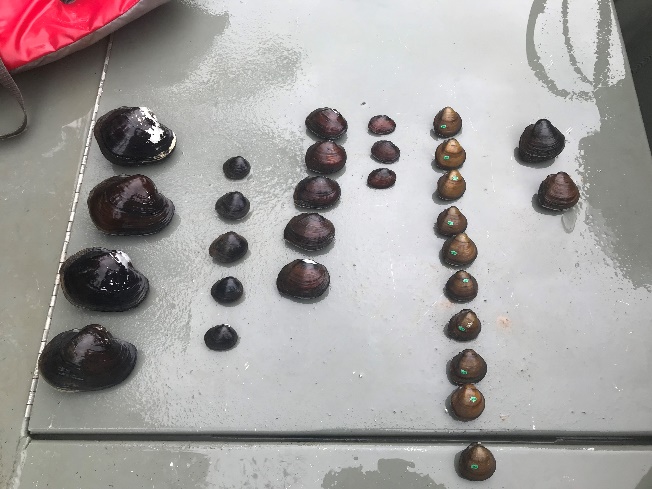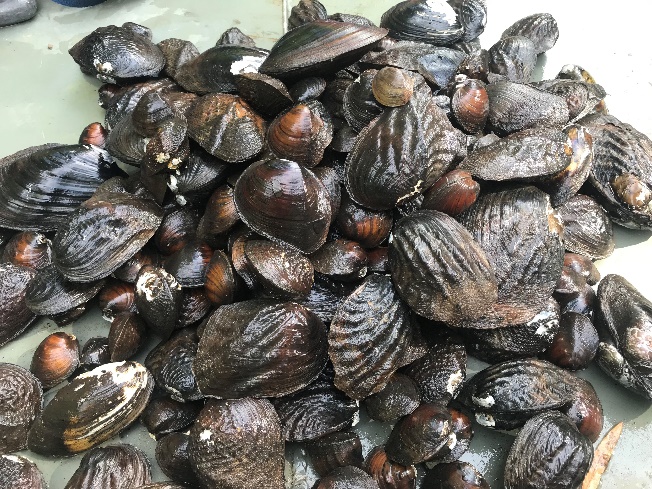
Moving Mussels
BIO-WEST was asked to help relocate native freshwater mussels during scheduled maintenance on the Lower Neches Valley Authority Main Canal last July.
The LNVA Main Canal was built in the late 19th century as part of a conveyance system designed to move water upland for city, industry, and agricultural use. The canal pumping stations needed maintenance done on them, which meant draining portions of the canal to expose aging pumps and replace them with newer, more efficient pumps.
The dewatering process posed a risk to the native freshwater mussels that are found in the canal. To help minimize mussel mortality and thus comply with Texas Parks and Wildlife Department recommendations regarding the protection of native aquatic species, BIO-WEST scientists worked with LNVA to develop an Aquatic Resource Protection Plan, obtain the proper permits and relocate freshwater mussels that were exposed during the canal drawdown.
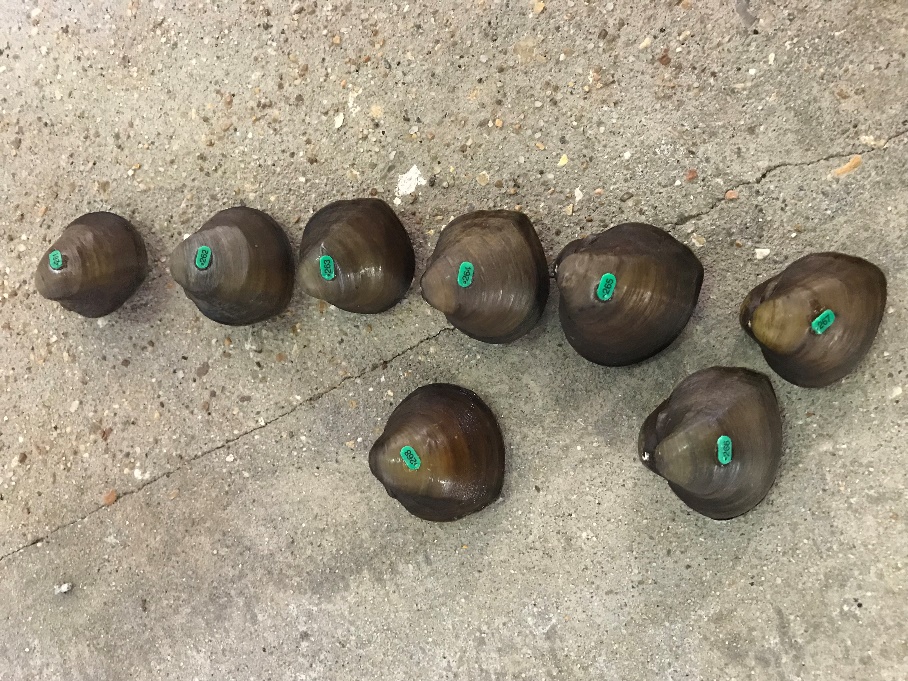
During the relocation process, BIO-WEST scientists walked the length of the canal, picked up any mussels that were left exposed and placed them in buckets or similar containers. The mussels were taken to a holding area to be identified and recorded. After that, they were transported by boat to a nearby relocation area and released.
To monitor the success of the relocation efforts, state-threatened mussels were tagged before being released. Numbered plastic tags were glued to the mussel’s shell and measurements were taken of each mussel. This will allow scientists to monitor the relocation area to see how many mussels survived being moved, if they stayed in the new area and if they grew in size in their new area.
About 13,450 mussels from 24 different species were relocated, including state-threatened species suchs as Louisiana Pigtoe (Pleurobema riddellii), Sandbank Pocketbook (Lampsilis satura), and Texas Pigtoe (Fusconaia chunii).
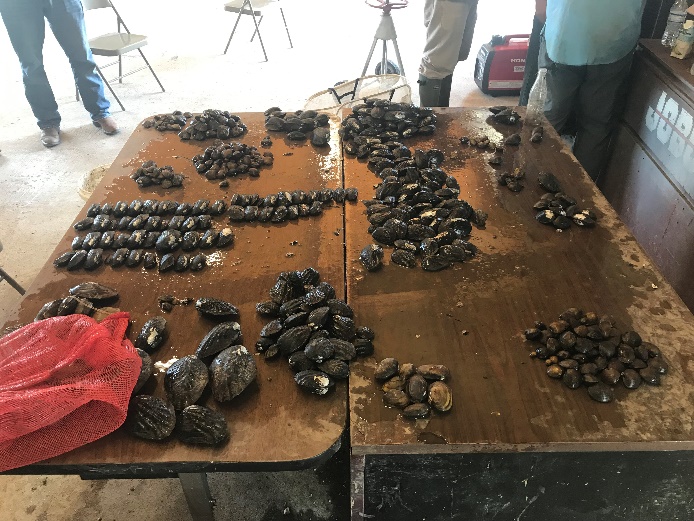
Look at those mussels
BIO-WEST was asked by LNVA to conduct mussel surveys in the Lower Neches River and Angelina River in east Texas last September.
The purpose of these surveys is to gather data on the freshwater mussel species that live in those rivers. There is limited information on the distribution and abundance of the species being studied. Most previous data has been collected in shallow water near bridge crossings. However, areas which are more remote and difficult to sample have been overlooked. So, the data being gathered will help paint a more complete picture about the distribution and abundance of these species.
Mussels were collected by a four-person crew in plots that were 150 square meters each. The crew used snorkels and/or a surface-supplied-air diving system, depending on how deep the water was in each plot. All the mussels found in the plot were collected, identified, counted and photographed before being returned to the sample area.
The US Fish and Wildlife Service is currently evaluating Louisiana Pigtoe and Texas Heelsplitter (Potamilus amphichaenus) for endangered species listing. So information gathered about both species were of particular interest.
USFWS will review the data collected from the survey to assist in determining whether or not the two species should be listed under the Endangered Species Act.
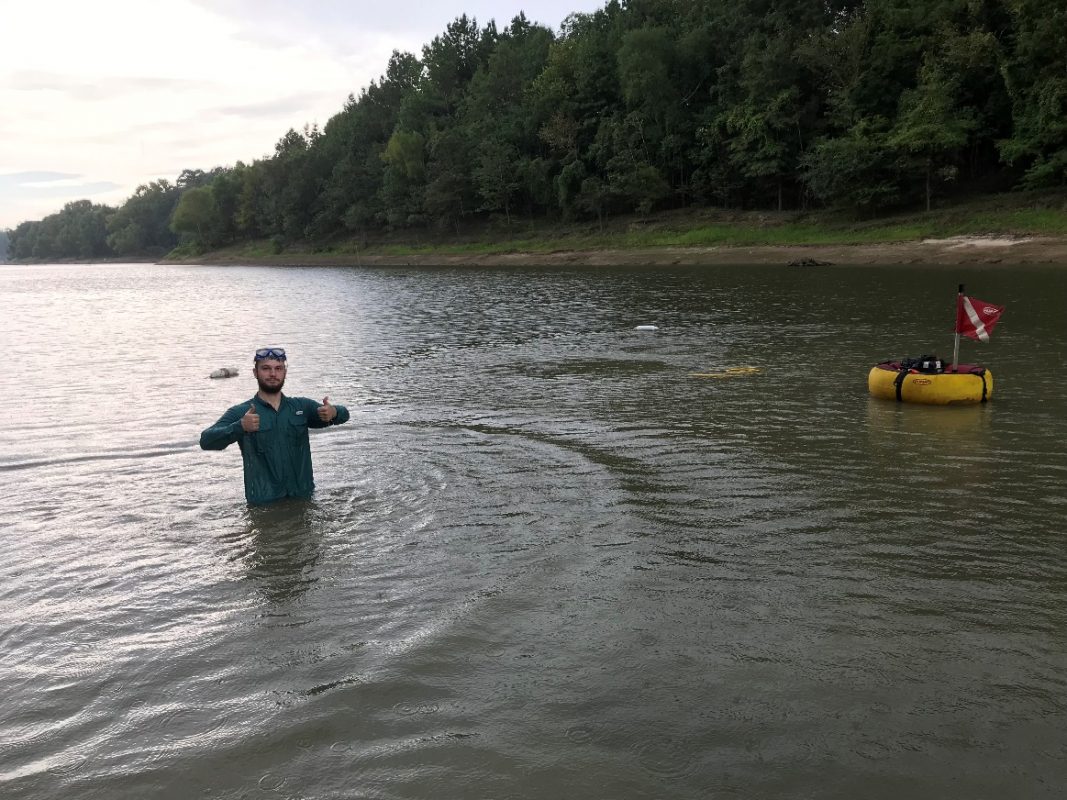
Endangered Mussels
In addition to the Louisiana Pigtoe and Texas Heelsplitter, several other Texas mussel species are being considered for listing under the ESA, including two species which occur in the Brazos River basin. BIO-WEST is currently working with the Brazos River Authority to develop a Candidate Conservation Agreement with Assurances. This agreement will outline voluntary conservation measures the BRA can implement to minimize negative impacts to the candidate species covered by the agreement.
The agreement will include activities designed to help conserve, monitor, and research these species. This includes a commitment by the BRA to avoid future projects in key areas of high quality mussel habitat. Additionally, it includes research activities designed to learn things like how each species reacts to temperature or how much dissolved oxygen is needed in the water.
The agreement will also outline public outreach activities to help teach landowners and the general public about what roles the freshwater mussels play in the ecosystem as well as ways to help in conservation efforts.
If the candidate species do become listed under the ESA, the CCAA will also provide the BRA with regulatory assurances through an Enhancement of Survival Permit. This agreement will allow BRA to continue their voluntary efforts to conserve the species post-listing, while assuring them that no additional restrictions will be enforced as a result of listing.
